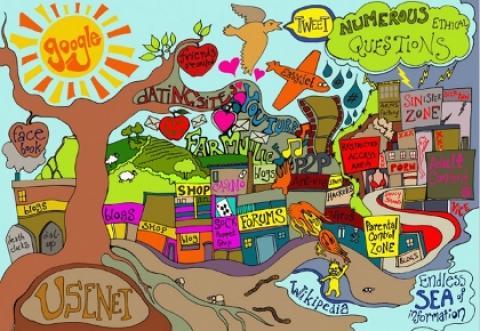- What Happens to the Internet After the U.S. Hands Off ICANN to Others? - Lee Rainie (Pew Research/FactTank)
- Turkey Steps Up Bid to Block Twitter After Users Flout Ban - Kevin Rawlinson (The Guardian)
- Netflix Makes Some Noise About Net Neutrality - Josh Levy (Free Press)
- MetaPhone: The Sensitivity of Telephone Metadata - Jonathan Mayer and Patrick Mutchler (Web Policy)
- Tim Berners-Lee: 25 Years On, the Web Still Needs Work (Q&A) - Steven Shankland (CNET)
What Happens to the Internet After the U.S. Hands Off ICANN to Others?
By Lee Rainie
March 20, 2014
Pew Research/FactTank
The Internet Corporation for Assigned Names and Numbers (ICANN) is a multinational organization that oversees the address book of the internet thanks to a contract issued by the U.S. government.
The contract expires in September 2015 and the U.S. Commerce Department announced that it would eventually transfer key internet "domain name functions to a global multi-stakeholder community." Some Americans worry this will cede "control" of the internet to nations that will impose regulations that change the basic open character of the internet and make it less hospitable to American interests.
Turkey Steps Up Bid to Block Twitter After Users Flout Ban
By Kevin Rawlinson
March 23, 2014
The Guardian (UK)
Turkey has stepped up its efforts to block access to Twitter after many users found ways to flout its ban. Internet service providers in the country are now blocking the addresses used by the site, making it significantly more difficult to get around the restrictions, analysts have said.
The move follows threats last week from Turkish prime minister Recep Tayyip Erdogan that he would "root out" the social media network, which he claimed has been used to spread wiretapped recordings that have damaged his government's reputation.
Netflix Makes Some Noise About Net Neutrality
By Josh Levy
March 21, 2014
Free Press
It's important that Netflix is coming out for "strong" Net Neutrality - and not the watered-down rules the Federal Communications Commission passed in 2010. Those loophole-ridden rules left Internet users open to corporate abuse, especially when it came to the mobile Internet.
As the recent kerfuffle with Comcast illustrated, big cable companies and Internet service providers are putting the squeeze on content providers, forcing them to pay up to ensure their content isn't degraded.
MetaPhone: The Sensitivity of Telephone Metadata
By Jonathan Mayer and Patrick Mutchler
March 12, 2014
Web Policy
Is telephone metadata sensitive? The debate has taken on new urgency since last summer's NSA revelations; all three branches of the federal government are now considering curbs on access. Consumer privacy concerns are also salient, as the FCC assesses http://apps.fcc.gov/ecfs/proceeding/view?name=13-306 telecom data sharing practices.
We used crowdsourced data to arrive at empirical answers. Since November, we have been conducting a study of phone metadata privacy. Participants run the MetaPhone app on their Android smartphone; it submits device logs and social network information for analysis. In previous posts, we have used the MetaPhone dataset to spot relationships, understand call graph interconnectivity, and estimate the identifiability of phone numbers.
We found that phone metadata is unambiguously sensitive, even in a small population and over a short time window. We were able to infer medical conditions, firearm ownership, and more, using solely phone metadata.
Tim Berners-Lee: 25 Years On, the Web Still Needs Work (Q&A)
By Steven Shankland
March 11, 2014
CNET
The World Wide Web is a smashing technological success. But the man who invented it wants it to break down more cultural barriers, thwart government snooping, and let the Web run applications not just house documents.


Spread the word